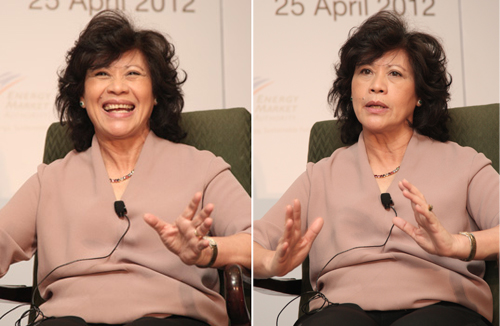
The world faces two energy challenges, according to Dr Noeleen Heyzer, Under-Secretary General and Executive Secretary of the United Nations (UN) Economic and Social Commission for Asia and the Pacific (ESCAP). Speaking at the Energy Market Authority's Distinguished Speaker Programme today, ahead of the Rio+20 Conference in June, she told the 250-strong audience that "we need to turn on the lights, and turn down the global thermostat".
Alleviating energy poverty and increasing energy access are vital for inclusive and sustainable development in Asia. To date, 670 million people still have no access to electricity. Coupled with the challenges of food and water shortages and a bleak financial landscape, Dr Heyzer was looking to the upcoming "Rio+20" Conference or Third Earth Summit to "reset" the global development agenda post-2015.
Dr Heyzer explained that the Millennium Development Goals established in 2000 had not taken into account the complexity of today's world, where global challenges are inextricably intertwined and solutions are mutually-dependent.The Millennium Development Goals also did not sufficiently address the critical role of energy play in sustainable development.
Underlining the importance of a "transformative change" in this century, she cited a newly-published report by the UN Secretary-General's high-level panel on Global Sustainability, titled "Resilient People, Resilient Planet: A future Worth Choosing". The report forces us to rethink the importance of sustainable development, and how countries could create an eco-system that can support us and the future generations.
Yet Dr Heyzer was quick to explain that the UN was not calling for countries to stop growing. "For many countries, not growing is not an option", she said while highlighting the deep poverty confronting many developing countries.

Pointing out that the pattern for growth thus far has been "to grow this first, and then clean up later", or to "grow this, then that", she emphasised that sustainable development for the future will require a coordinated effort from governments, markets and civil society to address the environmental, economic and social pillars simultaneously.
Dr Heyzer concluded her hour-long lecture by highlighting the importance of enhancing energy efficiency, of which the potential for energy efficiency gains in Asia is significant; increasing uptake of renewable energy; and continuing investments in clean energy technologies and infrastructure.